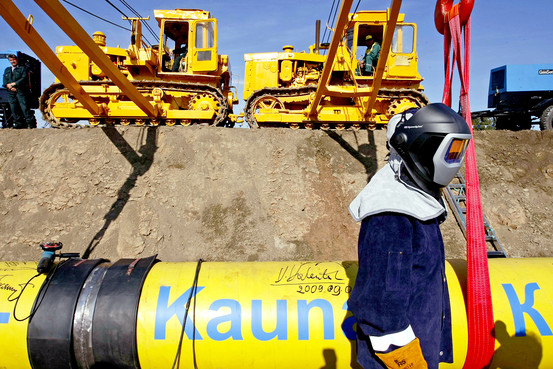
LNG Projects In Latvia And Lithuania Can BE Mutually Compatible
Publication: Eurasia Daily Monitor Volume: 8 Issue: 30
By:

Poland, Lithuania, and Latvia are each planning to build a liquefied natural gas (LNG) reception terminal with a re-gasification plant on their Baltic littorals at Swinoujscie, Klaipeda, and near Riga, respectively. These projects can break Gazprom’s monopoly in the three Baltic States and Poland, creating a competitive regional market through supply diversification and mutual interconnection. The desired time-frame for commissioning is 2014-2015.
However, the three projects’ aggregate capacities, as presently envisaged, far exceed Lithuania’s, Latvia’s, and Estonia’s aggregate gas consumption requirements. This dilemma is probably inevitable. LNG projects are generally considered commercially viable at no less than 4 billion cubic meters (bcm) per year in re-gasification capacity. Thus, the projects may end up competing against each other over investment funding and over political support in the Baltic capitals and in Brussels. Perceptions of mutually inflicted redundancy can doom these projects before they ever start.
The European Commission considers a partial solution to this dilemma. It supports construction of interconnector pipelines for re-gasified LNG, from the Baltic terminals to other parts of an evolving European energy market. This would allow the imported gas to flow southward into Central Europe, alleviating the inlands’ dependence on Gazprom. The link to Central Europe can also ensure commercial viability of the three LNG projects in the Baltic region, avoiding redundancies there. The European Union’s first-ever energy summit, held in Brussels on February 4, endorsed construction of such North-South interconnectors. Financing has yet to be found, however; and EU political support seems more focused on Poland’s Swinoujscie LNG project (and a North-South interconnector from Poland), than on the Lithuanian or Latvian LNG projects (Euractiv, February 7).
As a more immediate concern, Latvia’s current government (firmly pro-Western and battling corruption) needs to make clear that it has abandoned the idea of inviting Russia’s Gazprom or its affiliate, Itera, to build the LNG terminal in Latvia. Some Latvian politicians and interest groups had discussed this project in Moscow, along with a proposed gas storage site in Latvia. These proposals continue to distort the debates in public opinion and business circles in the Baltic region.
On February 10, Latvian President, Valdis Zatlers, declared that the state-owned electricity company Latvenergo (i.e, not a Russian company) would be commissioned to build the proposed LNG terminal near Riga; and that the terminal would be linked with the pipeline systems of neighboring Baltic countries and the European market at large. Zatlers spoke while visiting with Lithuanian President, Dalia Grybauskaite, in Vilnius. The Lithuanian side welcomed these assurances, which it had awaited for some time (BNS, Delfi, February 7-10).
The Lithuanian government had recently expressed serious concerns about a possible Russian-controlled LNG terminal in Latvia. Such a project (or its serious consideration) could doom Lithuania’s LNG project to redundancy, while aggravating dependency on Gazprom in the Baltic region. The Latvian government will now be expected to substantiate President Zatler’s position that Latvia would pursue a European solution to gas supply security.
An LNG terminal built and controlled by Gazprom (or its affiliate Itera) would strengthen Gazprom’s position in the Baltic region. The Russian side wants a dual-capable terminal, not only for import, but also for exporting Gazprom’s own gas in the form of LNG in the future. It would integrate the LNG terminal with the pipeline operator, Latvijas Gaze, which is jointly owned by Gazprom/Itera and its German ally E.ON Ruhrgas. Such arrangements would enable Gazprom to block, or shape, decisions regarding gas export-import operations, prices, and the transmission of gas, in its own interest.
To facilitate such arrangements, the Russian side has proposed to build a massive underground site in Latvia for storage and for the re-export of Russian gas. Some have argued that the storage would improve the country’s supply security, earn revenue for Latvia, and provide gas for planned construction of power and heating plants. More likely, however, it would undermine Latvia’s and the region’s supply security by reinforcing Gazprom’s monopoly position, pre-empting the Baltic States’ markets, and discouraging diversification efforts.
Latvia’s geology is uniquely suited for underground gas storage. This could become an incentive for building an LNG terminal in Latvia with European investors and enlisting the European Commission’s support for the project. To qualify for such support it needs the status of a regional or common European project, which would be ruled out if Gazprom gets involved in the project. Moreover, (as Zatlers noted while in Vilnius) Latvenergo itself is interested in gas supply diversification and competitive prices through access to LNG. This electricity company is Latvia’s largest gas consumer by far.
The gas-trading and pipeline-operating company, Latvijas Gaze, is controlled by Gazprom and its Itera affilate with a combined 50 percent of the shares; E.ON Ruhrgas holds another 47 percent. Gas market reform through “unbundling” (separating supply from transportation) is mandated by EU law, and would make the LNG project substantially more credible. Estonia and Lithuania are now taking steps in that direction. Lithuania has requested assistance from the European Commission for unbundling and de-monopolization of the gas market (Postimees, January 27; EDM, February 10).
In Vilnius, Presidents Grybauskaite and Zatlers agreed that the respective LNG projects can be compatible with each other if pursued as elements of an interconnected regional market, with a regional commodity exchange for gas, and linked via Poland with the wider European market (BNS, Delfi, February 10). This political consensus at the presidential level is expected to be followed up by governmental decisions. The Latvian government in particular needs to substantiate Zatlers’s assurances about Latvia’s choice. This should rule out Gazprom’s or its proxy’s involvement in the project, guarantee the terminal’s use for imports only (not exports), and exclude linkage with a Gazprom-proposed storage site. This approach, along with energy market reform through unbundling, could facilitate EU support and European investments for both projects.




